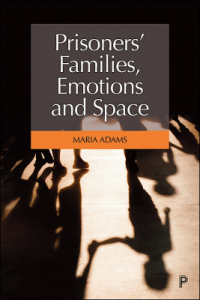The aftermath of the pandemic has created the possibility for new conversations about the purpose of the prison visiting room. The pandemic generated great fear and uncertainty for families of prisoners, with further tensions exacerbated including economic and food insecurity, psychological effects of COVID-19 and inconsistent financial and social support by the government.
During the pandemic, inconsistencies in government financial assistance adversely affected the most vulnerable groups. Concerns included employment precarity, lack of accessibility to public services, challenges around home schooling and access to affordable meals. All of these contributed significantly to the experiences of families of prisoners and how they maintained contact with their loved ones in prison.
The pandemic opened wider conversations about what quality family life means for those who have a loved one in prison. Over the course of the two years, prison visits have been affected by governmental guidelines that were inconsistent and precarious for prisoners and their families. Subsequently, there were growing concerns about the mental and emotional effects of families of prisoners. At the beginning of the pandemic, for example, there was a temporary ban on prison visits across the United Kingdom. This ban provoked many conversations on the ethical and moral issues surrounding the right to family contact for prisoners. Many argued that the lack of prison visits breached the rights of prisoners to maintain family life, and it was also inconsistent with the UNCRC (United Nations Conventions of the Rights of the Child) which campaigns for the rights of children to ensure contact is still prioritised when a parent is in prison. As time progressed, prison visits were reinstated, but strict regulations on the layout of visiting rooms created greater distance than previously between prisoners and their families. The quality of the visit was also diminished by testing regulations, mask wearing and a reduction in food and drink provision. All these factors heightened anxiety for families visiting their loved ones.
The purpose of prison visits was also called into question by the alternatives that were put in place during the pandemic, such as phone calls and virtual contact. The increase in digital communications like video calls served as an intermediary for contact between prisoners and families, and these new conversations opened a dialogue on how prisoners and families perform specific familial roles over the virtual space. Virtual communication on the part of the family often takes place within the family home, enabling prisoners to view this life from the outside. It also provides new opportunities for families to eat meals while they are speaking to their loved one in prison, offering prisoners a chance to connect with home routines. This provides a possibility of strengthening family ties between those imprisoned and family members, a move supported by Anna Kotova‘s recent work on video calls. On the other hand, it is important to be aware that there is still a violation of privacy as these visits are closely monitored by prison officers. There are new questions to consider about whether these virtual visits will have the same purpose as the visiting room; and if they can be sustainable in recreating family life.
My book Prisoners’ Families, Emotions and Space tackles the social and economic inequalities experienced by families of prisoners. It raises how crucial it is for families to play a role in discussions about the prison system, and further to this, provides an understanding of how families’ realities connect the inside of the prison and their communities. The themes in this book resonate with many of the complexities that have intensified for families in response to COVID-19 guidelines.
As we enter a new normal, the purpose of the visiting room is important to explore, along with the extent to which the virtual space can be compatible with real-life visits.
Maria Adams is Senior Lecturer in Criminology at the University of Surrey.

Prisoners’ Families, Emotions and Space by Maria Adams is available on the Policy Press website. Order here for £24.99.
Bristol University Press/Policy Press newsletter subscribers receive a 25% discount – sign up here.
Follow Transforming Society so we can let you know when new articles publish.
The views and opinions expressed on this blog site are solely those of the original blog post authors and other contributors. These views and opinions do not necessarily represent those of the Policy Press and/or any/all contributors to this site.
Image credit: AlexLinch on iStock.


